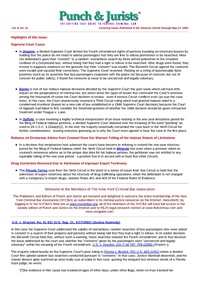Loaded on
Jan. 22, 2006
published in Punch and Jurists
May 27, 2002
This is one of those heavy habeas corpus decisions that flows from some of the obtuse language of the Antiterrorism and Effective Death Penalty Act of 1996 (AEDPA). Specifically, the nine Justices of the Supreme Court engaged in one of their now-famous semantical debates over the meaning of the …
Loaded on
Nov. 17, 2003
published in Punch and Jurists
May 27, 2002
In this case the Supreme Court addressed the validity of warrantless, random searches of bus passengers who were asked to consent to a search of their property and persons without being told that they had a right to refuse. In its earlier decision, the Eleventh Circuit held that, without …
Loaded on
Jan. 18, 2003
published in Punch and Jurists
May 27, 2002
This is one of those remarkably recondite habeas corpus decisions that requires a wall map to keep up with the proper pecking order and priorities of a series of past Supreme Court rulings in order to understand the Court’s ruling in this case. Essentially, the Court unanimously held that …
Loaded on
May 1, 2002
published in Punch and Jurists
May 27, 2002
Here the court held that reliance on erroneous advice of counsel as to the proper due date for filing a habeas petition did not constitute the type of "extraordinary circumstance" that warranted equitable tolling of the one year statute of limitations.
Ibrahan Ben Miranda, the petitioner in this …
Loaded on
May 1, 2002
published in Punch and Jurists
May 27, 2002
Here the Court again affirmed that a prison's no-gift publications policy which prevented him from receiving books violated the prisoner's First Amendment rights - although it upheld a claim of immunity by prison officials in an action for damages.
In this case, the plaintiff inmate sued defendant prison …
Loaded on
May 1, 2002
published in Punch and Jurists
May 27, 2002
Here the Court vacated a drug conviction because the government's primary witness at trial falsely stated that he had not entered into a plea agreement, which prevented the defense from from effectively cross-examining the witness.
Here the Court held that when the government's primary witness at trial falsely …
Loaded on
May 1, 2002
published in Punch and Jurists
May 27, 2002
The defendant in this case appealed his convictions for importation of marijuana and for possession of marijuana with intent to distribute on the grounds that the district court had abused its discretion by allowing the admission of expert testimony “regarding the structure of drug trafficking organizations in a simple, …
Loaded on
May 1, 2002
published in Punch and Jurists
May 27, 2002
Reversing a decision of the Michigan Court of Appeals, the Court held that the failure of petitioner's counsel to request an interpreter for the petitioner at trial constituted ineffective assistance of counsel that prejudiced the petitioner. The Court concluded that defense counsel "should have requested an interpreter for his …
Loaded on
May 1, 2002
published in Punch and Jurists
May 27, 2002
In a prior order, the court granted summary judgment to defendant, the Bureau of Alcohol, Tobacco & Firearms (ATF), holding that, although plaintiff applicant's signed consent did not authorize the disclosure to plaintiff's condominium association that he had applied for a federal license to sell firearms from his residence, …
Loaded on
May 1, 2002
published in Punch and Jurists
May 27, 2002
In this case, the defendant appealed his conviction and sentence for possession of escape paraphernaila in prison, in violation of 18 U.S.C. § 1791(a)(2). He argued that he was improperly denied the right to present a duress defense to the jury at his trial.
The facts of this case …
Loaded on
May 1, 2002
published in Punch and Jurists
May 27, 2002
This Sentencing Memorandum is noted principally as the culmination of many key decisions in the long and shameful saga of the many efforts by the FBI, the Department of Justice and many government officials to obstruct any investigation into the clandestine and protected activities of James (Whitey) Bulgar and …
Loaded on
May 1, 2002
published in Punch and Jurists
May 27, 2002
Here the Court granted the plaintiffs an injunction against the closure of all deportation hearings involving persons determined by the Government to be "special interest" cases, on the grounds that such a blanket closure violated the First Amendment.
Plaintiff news organizations, and an alien subject to a removal …
